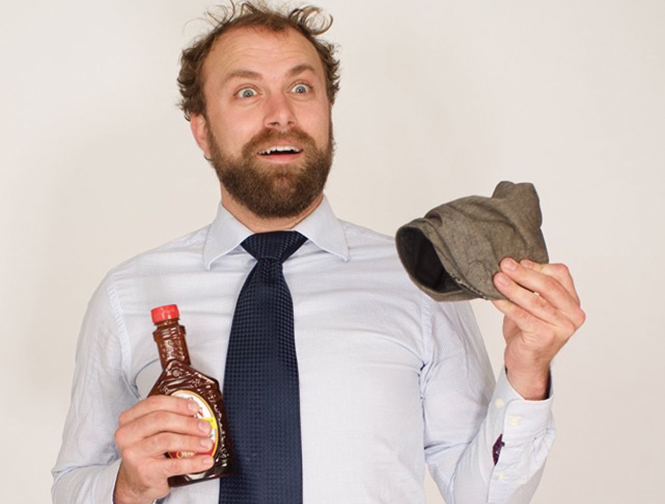Room Service
A locked-down hotel provides fodder for the virtual theater of The Open Syrup
By Scott Renshaw @scottrenshawA certain brand of madness has kicked in for many people as a result of being cooped up in quarantine. That includes plenty of theater professionals, whose physical theater spaces remain closed in an abundance of caution. Yet the ability to turn claustrophobia into comedy inspired one creative team's decision to take an existing concept, transform it for virtual presentation, and offer viewers a chance to laugh a little in the middle of all the craziness.
The Gateway's The Box performing arts space is currently offering The Open Syrup: Tales from Quarantine as a series of short recorded monologues for virtual theater enjoyment. A variety of characters at the Open Syrup Hotel share what they've been up to since lockdown commenced—whether that incudes a novice witch immersing herself in learning her spells, or a man losing his mind while finding himself identifying a bit too closely with sponges.
The Open Syrup as a concept was already ripe for exploiting, as it had been created by facilities director Jim Martin and writer Elise Barnett-Curran long before the pandemic began. Set in the titular hotel and featuring a wide range of fanciful characters, the plays were originally intended as a six-episode series of hour-long live productions. Three of those episodes had already been produced—with the fourth in rehearsals, and a musical installment in the works—when the lockdown began.
"We waited a couple of months, thinking maybe we can resume production, but it just hasn't happened," Martin says. "So we decided, 'Let's put together a virtual Open Syrup.'"
The concept was originally proposed by Martin to Barnett-Curran as a way to exploit a format—a continuing narrative—that live theater doesn't generally attempt. "I just told Elise that I thought it would be kind of fun to do a serial," Martin says. "What brings people to Netflix is the chance to binge-watch a show. I thought that was an idea that hadn't really been dabbled with in the theater."
"I wanted to do a comedy, so I wanted something where we could do rotating characters," Barnett-Curran adds. "I got these actors who committed to it completely, who wanted to play all of these different characters, and are still really committed."
The nature of Open Syrup as an ongoing narrative with existing, recurring characters made it an ideal format to pick up in this new form, but Barnett-Curran acknowledges that some changes were required to make it work. The most obvious involved the reality that these virtual episodes would be performed and recorded solo by individual actors in their own homes, which meant turning the more interactive nature of the live Open Syrup shows into monologues.
"When most playwrights start out, it's easier to write monologues," Barnett-Curran says. "So back in my start-out days, there were a lot of monologues going on in my plays. Open Syrup as a play, in general, there was a lot of back-and-forth dialogue, so I had to rethink these characters as kind of losing it on their own. Which all of us right now can kind of relate to: losing our minds a little bit."
She also admits that the writing process was harder, simply because she had to try to be funny at a time, and about a situation, when it's not necessarily easy to find humor. "I love comedy, that's my main focus as a writer, but right now it's really hard to be funny," she says. "I really had to pull it out, felt like I didn't have it in me. But then I kind of forced myself to do it, and it ended up working out much better than I thought."
Once the writing was done, there was the process of directing and filming the monologues themselves, which Barnett-Curran found to be a relatively painless process since the actors were already familiar with the characters. Then it just became a matter of understanding how to perform those characters for a camera, rather than for a live audience. "I write very specific stage directions, including for these monologues," Barnett-Curran says. "I think my directing style is, make sure you read the script, because it's in there. They got it: 'I need to lean toward the camera when I say this line.'"
While all involved recognize that this isn't the ideal circumstance for bringing theater to the people, they believe that it is theater, rather than something akin to a TV show, and that finding ways to connect with people right now is important, even if that requires re-thinking how the work is delivered.
"It's not optimal by any means, but I do think it's theatrical," Martin says. "It's very compelling anyway, even without the set or the audience. There's still a potential for reaching audiences this way."
More by Scott Renshaw
-
Film Reviews: New Releases for April 19
The Ministry of Ungentlemanly Warfare, Abigail, The Beast, Hard Miles, Sasquatch Sunset and more
- Apr 19, 2024
-
Faces of Salt Lake County book and portrait reception
Images and personal stories in a new book reveal local demographic diversity
- Apr 17, 2024
-
Feature film review: THE BEAST
A filmmaker's compelling ideas get a bit tangled in references to his creative influences.
- Apr 17, 2024
- More »
Latest in Arts & Entertainment
Readers also liked…
-
New TV for January 2023
Mayfair Witches, Velma, The Last of Us, Poker Face and more premieres
- Jan 4, 2023




